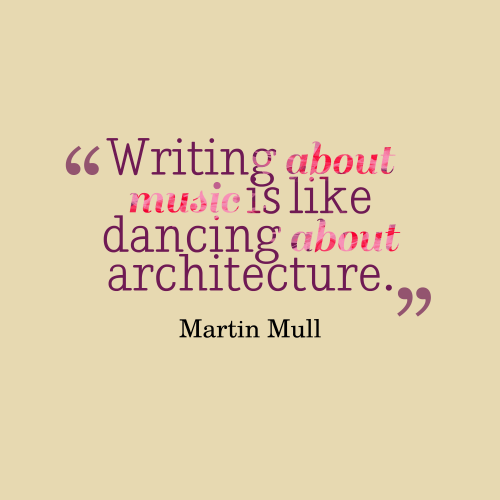I think about this subject a lot. In fact, I think about it every day. Although I usually don’t manage to review an entire album more than two or three times a month, I write almost every day about individual songs that I’ve heard. I tend to do that quickly, but even then, mixed in with trying to put sentences together in a near-frenzy, I’m thinking (fleetingly) about what makes a review of music worth reading.
I don’t have a single answer to that question. And even the many answers I’ve thought of aren’t all ones I feel capable of following, because I’m a self-taught amateur and I know my limitations. But I thought I’d spill some thoughts about the subject in this post, as much to provoke discussion by readers and other writers as to help myself in a continued groping for some kind of mental synthesis.
I think about what makes a good review from two perspectives, and they don’t exactly line up with each other: What’s fun to write, and what’s useful and entertaining to read. This is why there are so many different answers to that question with which I began: what’s fun to write varies with the writer and what’s useful and entertaining to read varies with the reader. It’s hard to make yourself and everyone else happy.
I know what I enjoy reading. I want to get a sense of the music’s sound and the skill of the songwriters and performers. I want to know something about the genre, and something about the band’s history and interests, if I’m not already educated about those things. But I’m almost equally interested in the skill of the writer. I want to love the prose as much as the anticipation of what I might hear. If a review is dull and drab, inarticulate and deficient in lively turns of phrase, I’m unlikely to go back to that writer a second time.
Great writing has always been a pleasure in itself for as long as I’ve been reading reviews (which is a long time), and of course for much longer than that. Maybe it’s even more important today, when almost every artist streams some or all of an album’s music even before its official release. If you can listen to the music itself, why would you spend time reading about it unless the writing itself is pleasurable?
Well, I suppose it’s still faster to read a review than listen to an entire album even when you have the chance to do that, but I suspect a lot of people still read reviews because they enjoy the words — if the words are enjoyable, and that’s a big if. I know that matters a lot to me, especially now that I have far less time to read reviews than I used to, because I’m too busy with my own listening and writing. So I’ve become selective, but I guess everyone is.
I also have a personal quirk (and maybe you have it, too): I’m drawn to writing that reflects the writer’s personality, writing that has distinctive flair. No matter how cogent the analysis, if the words are as dry and lifeless as day-old white toast, they just doesn’t hold much appeal. I want to feel that over time I’m getting to know the writer as a living, breathing person. I think that’s one reason I enjoy the reviews penned by the other writers at this site. We all have our flaws as writers, that’s for sure, but their distinct personalities come through in the way they write, and I get a kick out of it (though I admit that may have something to do with the fact that I actually do know and like them as people). I feel the same way about the writers I follow outside of NCS.
I guess it goes without saying, but I also pay attention to writers whose taste I trust. You have to learn that over time. And the people whose taste I trust may be different from the people you pay attention to, because we all want a writer’s tastes to line up to some significant degree with our own. Otherwise, we risk wasting a lot of time reading what they have to say. The truth is, this may be more important than the writing style (yeah, I’m contradicting myself). There are people I follow on the web, for example, both musicians and other fans, whose taste I trust so much that if they recommend something, I’m going to grab it even if they say nothing more about the music than “This is really good”.
There are professional writers who cover metal. Not a lot of them, mind you, but they do exist — people who actually get paid to write about metal. Some of them are really good, and some of them are simply glib — really talented with a clever turn of phrase, but they leave you relatively clueless about the music and sometimes even doubting their sincerity. The really good ones, though, they succeed at everything I’ve been talking about. They make me wish I could do what they do. I suspect they were all trained as writers, and I’m sure the best ones have a lot of natural talent, too. I read what those people write and I wonder what the hell I’m doing.
The training thing — that’s a rarity in metal writing, where the vast majority of people who slobber all over the internet with their thoughts are self-taught, and in many cases that means they have half-wits for teachers or bright people who just never learned how to write. Still, the training may be limited to how to put together a grammatically correct sentence, how to organize your thoughts, and when to realize that you don’t know how to spell that fucking word and it’s worth the time to look it up instead of guessing. I doubt there’s any real training, other than on the job, for how to write about music, and metal in particular. Yet even those basic elements of training in how to write in general, that tends to give some people a leg up over others.
Well, I’ve been going on and on about what I like to read, but there’s that other side of the coin: When I write about music, I want to have fun doing it. When it starts to feel like WORK, that’s when I’ll stop. I bet that’s true of other music writers, too. Yes, I’m very mindful of what I think readers want, but as I mentioned before, people don’t all want the same thing. What I want out of music writing may be very different from what you want. So a lot of the time I default to what gives ME pleasure in stitching the words together.
I think, broadly speaking, you can say two things about music: You can try to describe the sounds, and/or you can describe the way the music makes you feel. With metal in particular, a writer constantly runs up against limitations in trying to describe the sounds — and sometimes I wonder why I even bother with that, since most of the music I write about is actually streaming someplace. But putting that puzzle to one side, it’s tough to avoid repetition in describing the sound. I think that’s why so many metal writers are drawn to metaphors — because that can provide greater room for the avoidance of repetition and cliche, and for creativity.
Trying to describe the way music makes you feel can also be difficult (sometimes there’s just no cure for inarticulateness), but for me that’s where the fun really comes in. It’s like a form of release: I hear something, I get enthusiastic about it, I want to tell other people what I’m feeling, I want them to feel it too. Listening to metal is often a cathartic experience, and so is expressing the way you feel when something has affected your emotions in a powerful way.
I think that’s a big reason why I don’t write negative reviews. If I’m not feeling the music, then writing about it would be like… WORK! And who the fuck wants to work, especially when no one’s paying you to do it?
I’ve rambled on long enough. If you have any thoughts about any of these ideas, as a reader or as a writer, please leave a comment.
P.S. The photos in this post obviously have nothing to do with the subject matter. I couldn’t figure out a good way to illustrate it, so I figured, what the fuck, I’ll just use some pics of metal musicians with cats. They’re all from Alexandra Crockett’s forthcoming book, Metal Cats.







I completely agree with all those points man. Especially about the personal flair of a writer. As a general rule, there are few “professional” music critics I enjoy for all of those reasons you mentioned, bland writing and confusing phrasing. That’s also probably tied into to not letting the writing become work, because once it does you loose some of the joy and enthusiasm that made you start writing the piece at the start.
On a side note, pink italics on this site were moderately terrifying.
Shit, why didn’t I think of putting pink italics in the post as well as in the lead-off image?!?
This is good stuff. I was an english major in college — twenty years ago — and at the time I was a pretty serious writer. Now that I make my living at the keyboard in a different way, by typing shit into Linux boxes and getting them to behave, I often think about starting a blog. I’ve started a few blogs in the past ten years — a beer blog, and a daddy blog — and kept them up for a few months, but I lose momentum fast. I think that’s there’s two sorts of writing for me. The first is just getting thoughts out on the screen, suitable for email, facebook communication, blog comments, etc. The other is writing I intend other people to read, and that’s an entirely different process: write, revise, edit, discard, write, revise, edit, discard, write, revise, edit, publish. I have a massive amount of respect for people like you and other blogging heroes — savingcountrymusic.com is another example — who produce solid, interesting content, day in and day out, for years at at time, likely for almost no money. I know how hard it is to produce quality work in a rapid manner.
Thanks for the site — totally love it.
Thanks man. I think in my case I was just too stubborn (or too dumb) to quit, and in most cases the more you do something the better you get at it. In my case, I’m not at all sure my writing has improved over the years, but I do think I’ve gotten better at turning out my middling prose FASTER than I used to. 🙂
Very interesting point of view, that I entirely agree with you. That’s why I keep reading a lot of reviews, from various sites and blogs, in order to help me make up my mind about an album, even build a way to listen to the music and it’s special feature. In other words, reading about someone’s perception of the music/album is like wearing that person’s glasses instead of your own. It made me discover a hell lot of bands and albums. Like you, I have my preferred writers, because, as you mentioned, I like their style and I trust their opinions.
Thanks for sharing your thoughts on the matter.
“like wearing that person’s glasses instead of your own” — now THAT’s a good turn of phrase, and the idea of perceiving something through someone else’s senses is an interesting aspect of reading reviews I didn’t get into. Thanks for the comment.
I know in my case, I tend to read a lot of reviews just to keep on top of the ball when it comes to writing. I’m a total self taught amateur and even though it is a case of, ‘You are your own worst critic’ I still think of myself as being total garbage and that I can learn so much from everyone else. I’d love to figure out the secret to brevity but I still write like I’m writing for people trapped at work and I want to engage with them for some time rather than have them glance at it with the attention span of a fruit fly.
That said, I know when it comes to writing I tend to get detail oriented and wind up dissecting shit no one cares about, but I guess it comes from a standpoint of by the time I’m listening to a disc, everyone else is; so a review for me winds up like we’re comparing notes to see what everyone thought. I also try to stay away from the gore and viscera aspect side of things. I love flowery language and super vivid descriptions as much as the next guy but sometimes folks can get a little overboard and go straight into goregrind territory. Not to say I haven’t attempted it myself but for me, that music really has to evoke that sort of imagery – something increasingly difficult to do these days.
“We Write For People Trapped At Work”… I’m thinking this would make an appropriate blog sub-header. Better than “We Are Total Garbage”.
Agreed. I’m still total garbage, but as always, attempting to improve through experience. I like your reviews though man!
Very interesting and intelligent thoughts you had 🙂 It’s funny cause just some days ago I thought about the very same matter as my textbook about creative writing told me to listen to music and than to describe it with words, which I found extremely difficult. It seems to me that we have so many words and phrases to describe what we see but so few for what we hear…. Yeah.. Random thought sinking into nowhere.. Nevertheless I really like reading reviews and then listen to the music just to see how the reviewer transmitted the music into words and I get very excited when he mentions some impressions that I had as well. So personally, I like to read reviews which try to describe the sounds and the way the music makes you feel and which do not just make comparisons in the sense of “it sounds like… (this or that band).” Keep on doing reviews! I enjoy them and I enjoy the whole site very much!! maybe the best metal-site on the internet.. No gossip, no pointless bullshit! Just about the music and art… Cheers
Thanks for your good words about our site!
As far as reading reviews…I personally tend to skim them more than anything. Usually Im more interested in finding out whether a reviewer I trust gave an album a thumbs up or not because I file that away for further exploration on my own time. So, for me anyway, Im not so much interested in what he says about the album as I am what he ultimately scores the album..I do appreciate genre tags or a good comparison to similar albums/bands just so I kind of know what to expect and whether its something Id be into in the first place.
As for writing reviews…I agree with everything you said. One of the reasons Ive never really submitted an actual album review to your website is because I honestly dont know how to write one. Im good for about a paragraph at most and then after that I just sort of run out of things to say…which is why, even if my tastes dont always line up with some of the writers for this site, Im more than impressed by everyones ability to not only write as often as they do, but by their ability to go through and actually write full articles on just a single album. Self taught or not, analyzing music beyond a simple..”I like it..I dont like it” takes some impressive ability
From you, a paragraph does the trick for me. See above re people whose taste I trust. 🙂
Aww..My kvrmvdgeony heart just grew three sizes today 🙂
much respect to you and the rest for running a great site man
this is really the only review site I read, I both tend to like your writing style and I mostly trust your opinion 🙂
I say mostly because my tastes are quite a bit more narrow than yours, but if you write about something I will normally click through and at least listen to the first few seconds of a song even if I have my doubts about it.
On writing I’ve always thought one of the best resources out there is The Economist’s style guide[1], lots of simple rules to writing clearly and concisely. I rarely manage to follow them, but I try be aware of it. Orwell’s six rules (which they quote in their intro) are also worth bearing in mind:
1) Never use a Metaphor, simile or other figure of speech which you are used to seeing in print.
2) Never use a long word where a short one will do (see Short words).
3) If it is possible to cut out a word, always cut it out (see Unnecessary words).
4) Never use the Passive where you can use the active.
5) Never use a foreign phrase, a scientific word or a Jargon word if you can think of an everyday English equivalent.
6) Break any of these rules sooner than say anything outright barbarous (see Iconoclasm).
[1] http://www.economist.com/styleguide/introduction
My favorite essay about writing style is from Mark Twain’s scathing “The Literary Offenses of James Fenimore Cooper”:
The author should:
Say what he is proposing to say, not merely come near it.
Use the right word, not its second cousin.
Eschew surplusage.
Not omit necessary details.
Avoid slovenliness of form.
Use good grammar.
Employ a simple, straightforward style.
Don’t use no double negative
I love this! Can’t believe I’ve never seen it before. I wouldn’t say no to DGR’s addendum either.
Its a knee jerk reflex from my english classes in high school. Teacher kept a bunch of real short phrases that used obviously wrong syntax, grammar, and the like in order to illustrate ‘how to write goodly and stuff’. Whenever I see, short and terse sentences about how to write,’ Don’t use no double negative’ pops into my head.
These are great rules, and I want to peruse The Economist’s style guide. When I was being taught how to write, I was horsewhipped repeatedly with Strunk & White’s “The Elements of Style”, and though it’s now an ancient text I suspect it’s still highly relevant. As I remember it, it included the same or similar guidelines as the ones you quote. Obviously, I still haven’t mastered those rules.
Well I’m glad you and your metal compagnions still find the inspiration and drive to keep writing those reviews and other posts of the like. The internet would be a vast darkness for me and it would be nigh impossible for me to find new music without this particular site.
As for the topic at hand: besides the year-end lists I don’t write reviews myself (though I do recommend music to a lot of friends and family) so I know little about the reasons for doing that, but every word about reading someone else’s reviews are true for me too.
Thanks for the enjoyable read! Besides, I think you give yourself too little credit with regards to your level of writing; which is quite high I’d say (even though I am not a native speaker, so what do I know).
Cool article. Thoughtful.That said i remember Cosmo Lee putting it across in one of his articles that for him, he almost completely stopped reading album reviews. So that he develops his own style.
Maybe he did that after he had already gotten as good as he was. I don’t know how I would be able to get better without reading people who I think are really good at it — I have no other teacher. But I don’t think that means you should, or necessarily will, copy someone else’s style. You still have to be yourself. I guess that’s somewhat liek walking a tightrope.
I actually don’t read too many reviews of albums I haven’t listened too, but rather prefer to read the reviews after I have listened an album. Reading someone else’s opinion and perspective allows my own to evolve and change. Sometimes I then realize how awesome an album is, and other times the flaws become way to apparent.
I like to do both. I’ll skim over reviews of bands/albums that I’m not familiar with to see if I want to give them a shot. Then I usually try to look up some reviews after I’ve listened to an album a few times, because a well-written review can really give you an entirely new perspective on what you’ve been hearing. Sometimes I’ll even read or re-read reviews months or years after I’ve been listening to an album. As my tastes change, develop, and broaden over time it’s interesting to read other folk’s opinions and compare what I used to think about an album to what I think about it now. Sometimes I can even discover new aspects to the music that I’ve been enjoying for years.
Age has been a prohibitive factor in becoming anything more than a self-taught writer for me. I recognize that I’m not going to be able to write in any way that reflects training. Thus, I tend to go for a twofold approach when writing a review: conversational, and enthusiastic. I personally respect a writer who has the huevos to write from off their high horse, and will simply tell you how great an album is in the same terms your friend would tell you in conversation (hence the enthusiasm). Both of those things bloom greatest here at NCS (as compared to any other site I’ve seen), and pretty much represents the totality of why I started writing at all, and honestly, if it weren’t for discovering this site I wouldn’t be a writer at all.
The above was really awfully written, and I feel bad for not proofreading it to make it cogent. But I had an English final today, so I’m out of my allotted cogent writing minutes for the day.
Great summary of the challenges, and like most people here I think you’re on the money. Certainly I remember about the time I discovered NCS I was reading a few different blogs, but they’ve pretty much dropped off my radar and now I lurk around here all the time (lucky you!). And the writing style was part of the draw, particularly that idea of seeing the writer’s personality shine through and feel like you’re reading the thoughts of a real person; genuinely interested in the music, but also a little quirky 🙂
It’s been great having you around, both as a lurker and as a contributor. And thank you for using “quirky” instead of some other word. 🙂
great post! i’ve said it before but some of the things that keep me coming back to NCS are the lengthy, thoughtful posts and noticeable lack of negativity. i can find hundreds of new sites every day that offer up negative reviews of bands and albums that the authors (and the readers) claim to despise. it’s a cheap, easy way to write that requires zero skill or creativity.
i would rather invest my time in a site devoted to the love of music, not the hate of it.
Loved reading this, thank you.
As only ever the reader, I was still able to associate with how you approach and feel about writing to how I think and feel when discussing music with my peers.
It’s choosing your words wisely while being conscious of, like you say, avoiding repetition. What I too find loveable and yet equally enraging about the expansive soundscapes within the genres of metal is they allow for both freedom to clearly depict experiences or can just as easily initiate the free fall into an abyss of…well yeah. Ha!
Also agreeable, that it is done for the sheer enjoyment. To which again, I will thank you for your fantastically balanced literary style and congratulate you on this mighty fine site. x